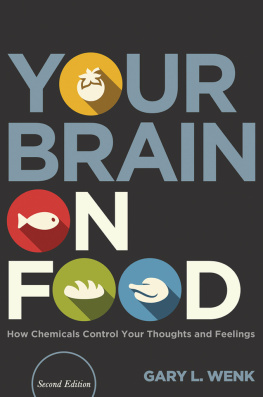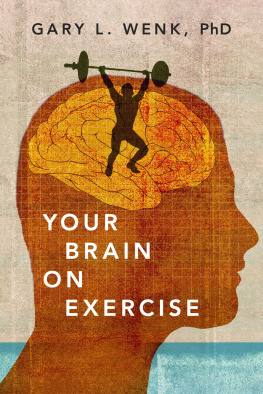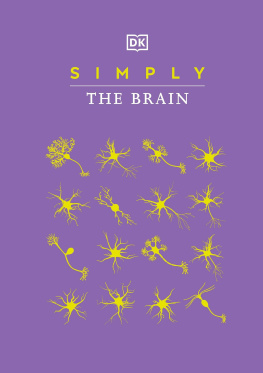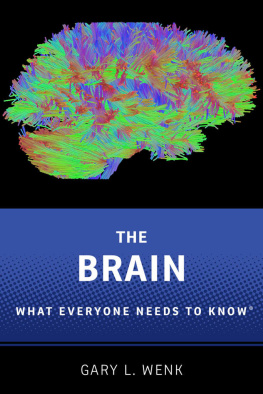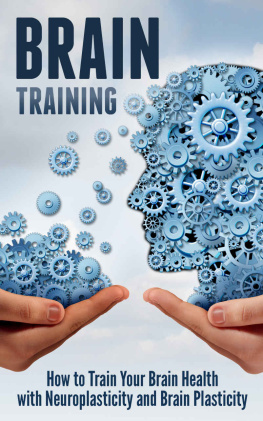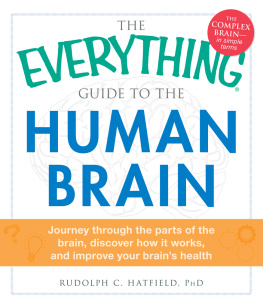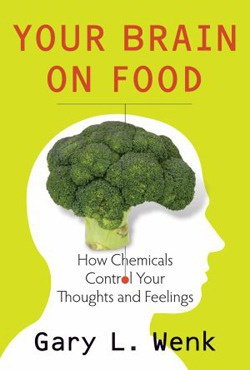THE BRAIN
WHAT EVERYONE NEEDS TO KNOW
THE BRAIN
WHAT EVERYONE NEEDS TO KNOW
GARY L. WENK


Oxford University Press is a department of the University of Oxford. It furthers the Universitys objective of excellence in research, scholarship, and education by publishing worldwide. Oxford is a registered trademark of Oxford University Press in the UK and certain other countries.
What Everyone Needs to Know is a registered trademark of Oxford University Press.
Published in the United States of America by Oxford University Press 198 Madison Avenue, New York, NY 10016, United States of America.
Oxford University Press 2017
All rights reserved. No part of this publication may be reproduced, stored in a retrieval system, or transmitted, in any form or by any means, without the prior permission in writing of Oxford University Press, or as expressly permitted by law, by license, or under terms agreed with the appropriate reproduction rights organization. Inquiries concerning reproduction outside the scope of the above should be sent to the Rights Department, Oxford University Press, at the
address above.
You must not circulate this work in any other form and you must impose this same condition on any acquirer.
Library of Congress Cataloging-in-Publication Data
Names: Wenk, Gary Lee, author.
Title: The brain : what everyone needs to know / Gary L. Wenk, PhD.
Description: New York, NY : Oxford University Press, [2017] | Series: What everyone needs to know | Includes bibliographical references and index.
Identifiers: LCCN 2016030741 (print) |LCCN 2016042204 (ebook) | ISBN 9780190603397 (pbk. : alk. paper) | ISBN 9780190603403 (hardcover : alk. paper) | ISBN 9780190603410 (UPDF) | ISBN 9780190603427 (EPUB)
Subjects: LCSH: Brain. | Neuropsychology. | BrainPsychophysiology.
Classification: LCC QP376 .W46 2017 (print) | LCC QP376 (ebook) | DDC 612.8dc23
LC record available at https://lccn.loc.gov/2016030741
For Jane
CONTENTS
My goals in this book are to provide the most accurate and up-to-date information possible, with the caveat that facts evolve and continually are being modified by new knowledge, and to present this information in a language and format accessible to a novice reader. The chapters provide answers to questions such as: How did the brain evolve? What is an emotion? What is a hallucination? How do you learn? How does your diet affect how you think and feel? What happens to your brain as you age?
Many authors begin with a discussion of neuroscience with the assumption that the reader needs to know all of the basic brain anatomy and chemistry before proceeding. I have chosen to place this chapter on neuroscience at the end of the book. In addition, I have tried to keep the jargon to a minimum and have included occasional reminders of the meanings of terms within each chapter. Should you wish to know more about some terms, I have included a Glossary at the end of the book. I have written the chapters so that they can be read in any order; I encourage you to begin with the topic that you find most interesting.
Ren Descartes speculated that the mind exists independent from the brain. Today, almost four centuries after Descartess death, we still do not fully understand how your mind emerges from the electrical and chemical processes that occur in your brain. This book introduces you to the answers that have been obtained thus far. I sincerely hope that reading this book encourages you to learn more about the wonderful organ of the mind that lives in your head. You will discover that our current understanding of the brain is incomplete. You also will discover that there are many interesting and related topics that have not been discussed in this book. My goal has been to present what I believe everyone needs to know about the brain , rather than everything that is known about the brain . In addition, I have chosen to focus upon only a few of the most common neurological diseases or mental illnesses, such as Alzheimers and Parkinsons disease and depression.
During every stage of the writing, the text benefited immeasurably from the brilliant editorial suggestions of my wife, Jane, who shaped my concept of my audience and how to reach them; she skillfully converted my jargon into intelligible prose and contributed additional concepts and topics that made the book into a more comprehensive discussion of the brain. I learned to trust her judgment and insight more than my own; if there is wisdom in my writing, it has evolved under her guidance. For more than 36 years, I have been blessed to share my life with this wonderfully patient and intelligent woman who has enriched my life in countless ways. This book is dedicated to Jane.
I am deeply indebted to my editor, Joan Bossert, for asking me to submit a book on this topic in the Oxford series on What Everyone Needs To Know . Since that day, the clarity of her advice and her unswerving encouragement have been invaluable. This books core derives from a course of lectures that I have given for the past 35 years to first-year psychology and biology majors. At first, I assumed that I was teaching students about the brain; ultimately, I realized that I was teaching them how to understand themselves.
).

Figure 1 Your brain is the command and control center for your nervous system and body. It receives input from the sensory organs and sends output to the muscles. The human brain has the same basic structure as other mammal brains, but it is larger in relation to body size than any other mammal brain. The brain makes up about 2% of your body weight. The largest part of the human brain is the cerebrum, which is divided into two hemispheres. Underneath lies the brainstem, and behind that sits the cerebellum. The outermost layer of the cerebrum is the cerebral cortex, which consists of four lobes: the frontal lobe, the parietal lobe, the temporal lobe, and the occipital lobe. The cerebral cortex is responsible for complex thought, sensory processing, and movement. Visual processing takes place in the occipital lobe, near the back of the skull. The temporal lobe processes sound and language, and includes the hippocampus and amygdala, which play roles in memory and emotion, respectively. The parietal lobe integrates input from different senses and is important for spatial orientation and navigation.
Human brains use a lot of energy. Under normal circumstances, the brain primarily uses energy in the form of sugar: the equivalent of about 12 donuts every day! (Now you can understand why there are so many donut shops located along your morning drive to work.) Your body spends nearly a quarter of its food budget on just the brain; five times as much as most other mammals devote to their brains. Your brain uses most of this energy to organize your behavior to find food, avoid danger, and socialize with others in order to find a mate with whom to reproduce. You know one manifestation of this imperative as dating, and it requires a very large and complex brain to pull this off successfully. Eating and sex are obviously excellent ideas if your purpose is to maintain and propagate your species; fortunately, your brain does an excellent job achieving both of these tasks.


